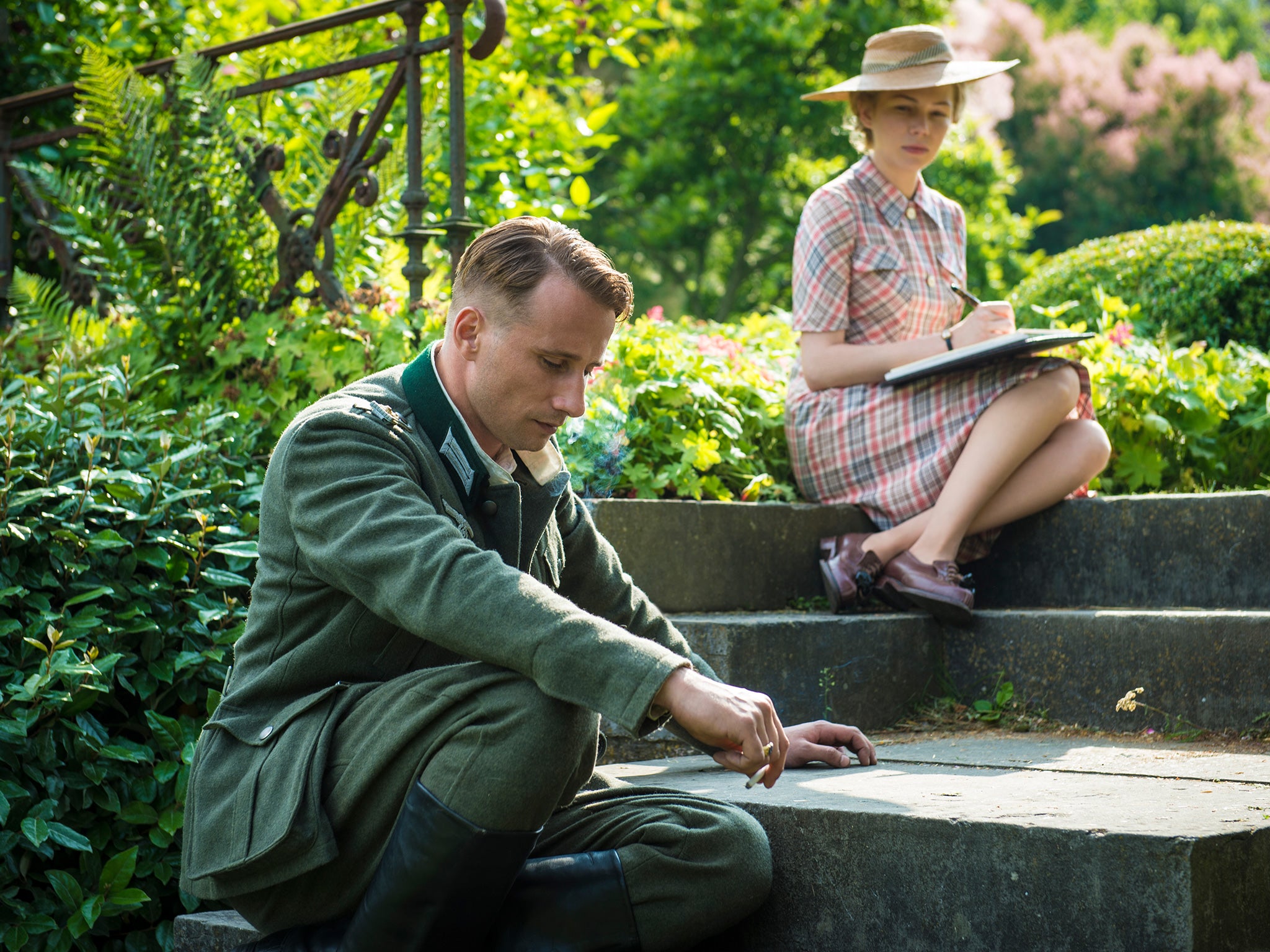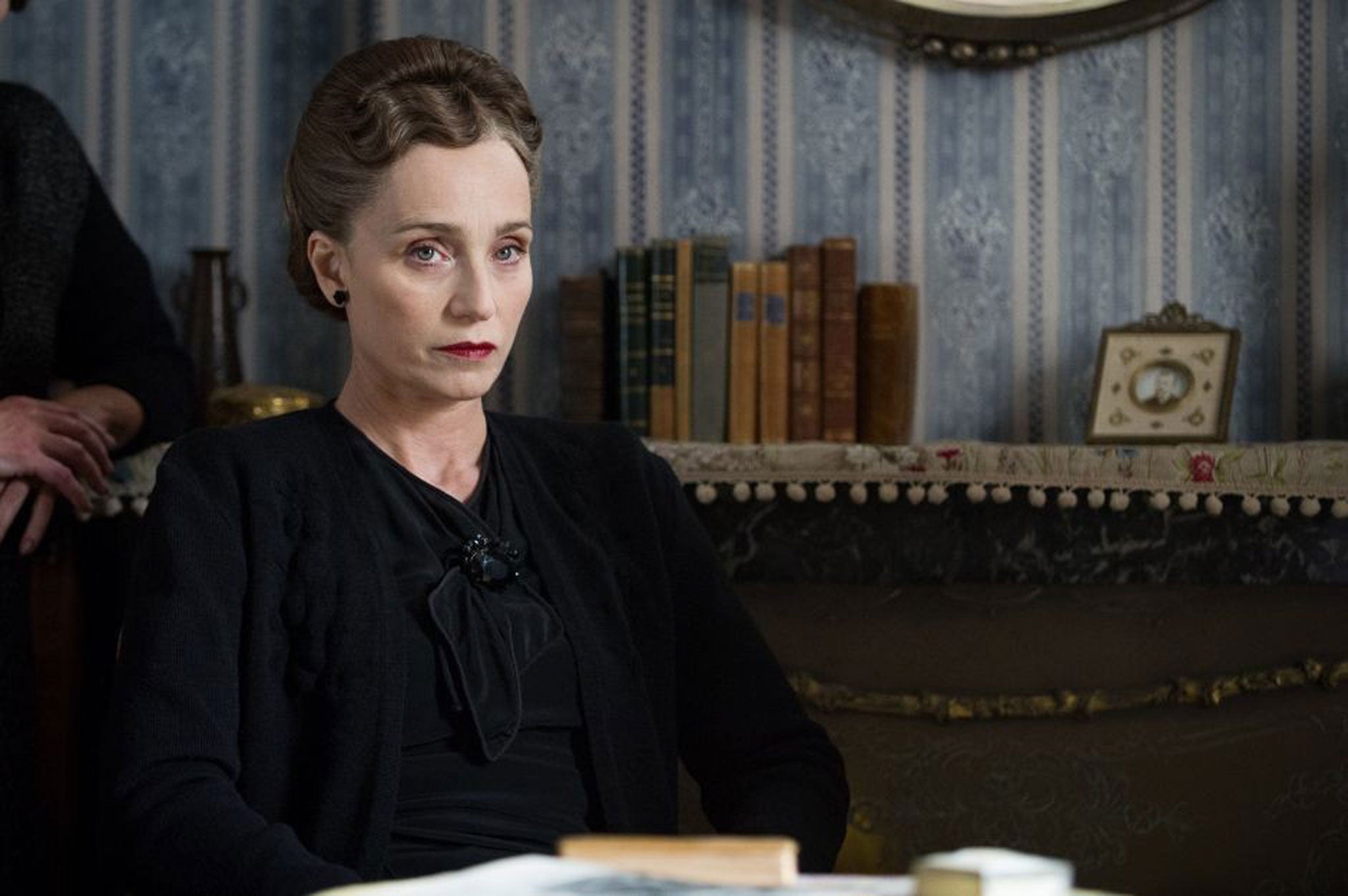Suite Française, film review: A romantic but discordant dispatch on love and war
(15) Saul Dibb, 107 mins. Starring: Michelle Williams, Kristin Scott Thomas Matthias Schoenaerts, Margot Robbie, Ruth Wilson

Irène Némirovsky's unfinished novel Suite Française, written shortly before her death in Auschwitz in 1942 but not published until 2004, was described by the French newspaper Le Monde as "a masterpiece… ripped from oblivion". It was as if, from beyond the grave, Némirovsky was giving a modern-day readership an intimate eyewitness account, harrowing and ironic, of the experience of the Nazi occupation for the French. She wrote about both good and bad behaviour, heroism and cowardice, in every stratum of French society.
Saul Dibb's film version is unabashedly romantic. Based primarily on "Dolce", the second part of Némirovsky's book, it is a rousing but lop-sided adaptation of the novel. The emphasis is firmly on the love affair between the unhappily married French woman Lucile Angellier (Michelle Williams) and young German officer Bruno von Falk (Matthias Schoenaerts). As we hear Lucile's emotional voice-over or see shots of her with the sunlight glistening in her hair while elegiac music plays on the soundtrack, the film skirts close to Brief Encounter-style melodrama.
As the story begins, France has fallen to the Nazis. Black-and-white newsreel footage and ominous music over the opening titles signal the calamity. Everything is in flux. There has been a mass exodus from Paris. In the rural town of Bussy, the refugees arrive in their masses, followed by a regiment of German soldiers. Nazi officers are billeted with the locals.
Lucile is living a quietly wretched existence in the country house she shares with her detested mother-in-law, Madame Angellier (Kristin Scott Thomas). Lucile's husband, whom she doesn't love, is a prisoner of war in Germany. She is dismayed by Madame Angellier's attitude toward her tenants. "They don't want to pay rent but don't think twice about buying silk stocking," Mme Angellier grumbles as she bullies the tenants into handing over whatever money they have.
The early scenes are effective in capturing the chaos that followed the Nazi invasion. In one spectacular set-piece, Lucile and her mother-in-law, driving around the countryside, blunder into a long column of refugees who've come from Paris, unprepared for their long trek. When the column is bombed, the deafening noise adds to their disorientation. There is a surrealistic feel to the images of well-dressed but exhausted civilians cast adrift in the picturesque countryside, trying to cope with the death and destruction around them.
The French characters speak in English with BBC-style accents. This is incongruous (especially as they write in French) but preferable to the 'Allo 'Allo!-style grotesquerie of many British dramas about the French resistance. The screenplay, by Dibb and Matt Charman, strives to go beyond the usual caricatures found in Second World War movies. It would be perverse in the extreme to portray the Nazis as sympathetic. There are plenty of gimlet-eyed fanatics on display, browbeating the French and even changing the time on their clocks. "You are defeated. We are now in charge!" one officer shrieks at the defeated townsfolk. However, the film-makers also attempt to show the deeply ambivalent feelings of the French toward their invaders. In one unwittingly comic scene, some local women are intrigued by the strapping soldiers in their midst. "There had been no men in our town for so long," the voiceover gushes as we see the women ogling shirtless Germans in the square. Others regard the arrival of the Wehrmacht as an excuse to settle scores and write letters to the German commanders gleefully denouncing their neighbours.
As the occupation continues, it provokes acts of venality, cowardice and hypocrisy as well as of extreme heroism. Local aristocrats Viscount de Montmort (Lambert Wilson) and Viscountess de Montmort (Harriet Walter) organise picnics with the Germans. Farm worker Benoît Labarie (Sam Riley) detests them and is ready to take arms against them, not least because strutting young Nazi officer Kurt Bonnet (Tom Schilling) is making approaches on his wife (Ruth Wilson). Buxom local lass Celine (Margot Robbie in lusty French peasant mode) doesn't have compunctions about sleeping with the enemy. Scott Thomas's Mme Angellier is so dogged in her hatred of the Germans that she finds unlikely reserves of courage and patriotism.

Many of the characters seem like stock types but there are some fine performances. Scott Thomas captures Mme Angellier's mix of snobbery, spite and stubborn bravery. Harriet Walter and Lambert Wilson bring ghoulish dignity to their roles as self-centred aristocrats. Williams is nuanced and sensitive as Lucile. First encountered, she is a quiet and repressed woman, despised by her mother-in-law and leading an oppressive existence, waiting for the PoW husband she doesn't love to come home. Williams has the ability to convey profound changes in emotion through tiny shifts in expression. She subtly shows how her initial hostility toward the German officer Bruno abates. He loves music, as does she. He is sensitive (when he is not carrying out executions in the town square) and respectful to her. As she falls in love with him, her character is transformed. She becomes outgoing, passionate. Schoenaerts is likewise impressive as the cultured German officer who seems too thoughtful to be part of the Nazi killing machine.
In her novel, Némirovsky wrote of the "harmony of the senses" between the lovers. Dibb's film shows us clearly and movingly how Lucile and Bruno, outsiders in their own communities, find solace with one another. The downside is that by foregrounding their romance, the film risks stripping away the ambiguities in the novel. With its piano music, voiceover and B-movie ending, the storytelling can verge on the trite. Suite Française is handsomely made and boasts two exceptional central performances but its tone is strangely discordant. A partial adaptation of an incomplete French novel shot in Belgium by a predominantly British crew using English as its main language, this is a film that can never escape its contrivances.
Join our commenting forum
Join thought-provoking conversations, follow other Independent readers and see their replies
Comments